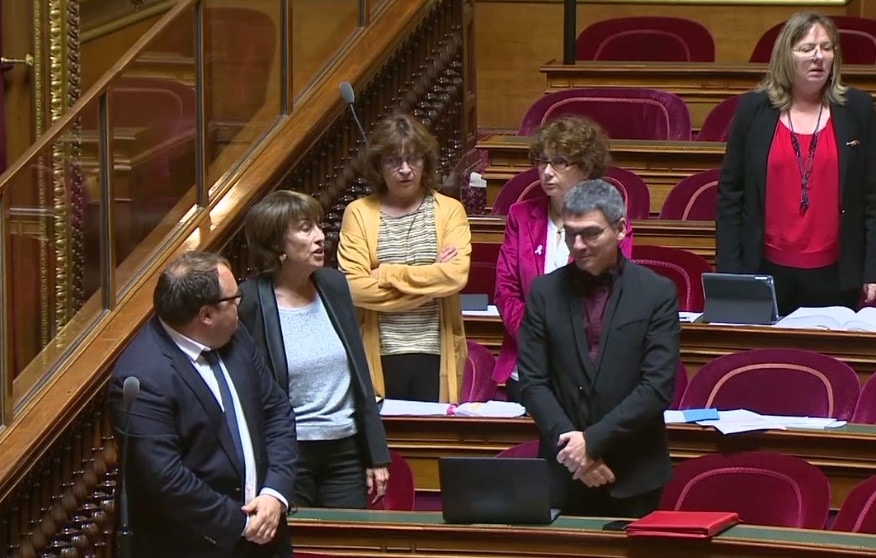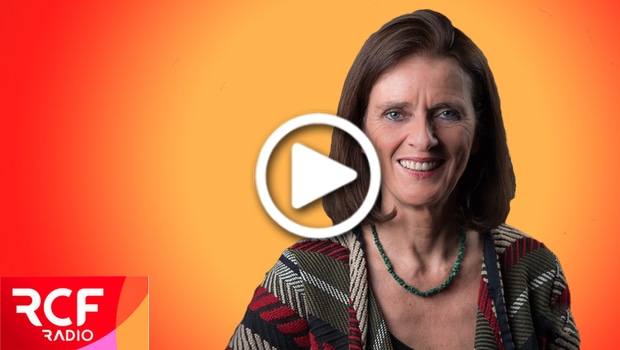
by Alliance VITA | June 7, 2019 | Abortion, News
On Friday June 7, the French Senate adopted an amendment introduced by Senator Laurence Rossignol, to extend the time limit for legal abortions from 12 to 14 weeks of pregnancy, as part of the country’s new health bill.
Following a rising ‘surprise’ vote, in a practically vacant session, 12 voted in favor and 10 against. Thus the amendment was adopted in spite of opposition by the government and the rapporteur, Alain Milon.
Mrs Rossignol quoted one of the claims of the family planning protesting that there is no “scientific consensus about the definition of a legal time limit”.
French senator Rossignol also sponsored an amendment to revoke the specific conscience clause for abortion. This time, the bill was rejected by a vote of 247 to 92, since those present can cast absentee ballots on behalf of those who are not present.
When the joint committee meets to rule on the complete text of the bill, this article is expected to be rejected.
Alliance VITA points out:
This ideological “coup” is very far from considering the real life of women and couples who face unexpected pregnancies. To promote more and more abortions, without proposing any other options in a situation where lives are at stake, is absolutely irresponsible. Our position is to repeat our appeal for a scientific report on the situations that lead women to request abortion and on the consequences following this act in order to have a genuine abortion prevention policy.
A 2016 IFOP survey reported that 89% of French people believe that abortion leaves women with psychological scars, and that 72% think society should help women avoid abortion.

by Alliance VITA | May 24, 2019 | News
“Euthanasia, Behind the Scenes”, is a new book published by Mols, on the end-of-life and the consequences of euthanasia.
The foreword of the book was written Jacques RICOT, philosopher, and Dr Timothy DEVOS, hematologist and professor at Leuven University Hospital, coordinated the contributions from 8 well-known Belgian caregivers specialized in palliative care, including university teachers, doctors, nurses and ethicists.
Since 2002, when euthanasia was decriminalized in Belgium, requests have become rather commonplace. The authors chronicle their experience and reflections on euthanasia and end-of-life care in Belgium. Not only for caregivers, these notes are noteworthy for anyone who has questions about the sense of suffering, the meaning of life and death, and the consequences of the 2002 law which continues to raise many questions.
![[Press Release] European Elections: VITA Focuses on Fragile Generations](https://www.alliancevita.org/wp-content/uploads/2019/05/generations-fragiles-1.jpg)
by Alliance VITA | May 23, 2019 | Old age and Dependency, Press Releases
Two days before the European elections, Alliance VITA gives the results of its awareness campaign for “Fragile Generations”.
While all across Europe, countries are facing the social and humanitarian challenges of demographic decline and population ageing, the French are becoming more aware of the urgent need to foster intergenerational solidarity. The three steps of the campaign included:
1 / An IFOP opinion poll carried out for Alliance VITA which revealed that the majority of the Germans, and an even greater percentage of the French (78%), think that Europe has been focusing too much on economics and finances, and not enough on human and social aspects. In France, 52% consider that anxiety about the future keeps the birth rate down.
2 /In 120 cities throughout France, the public openly welcomed the 1000 volunteers distributing 100,000 informational leaflets, containing 10 observations, 10 different proposals, and suggesting a personal gesture in favor of intergenerational solidarity.
3 / An opinion survey was carried out in the streets by volunteers in 120 cities.
Of the 3000 people responding:
- 63% lament that “individualism or selfishness” is the main reason that individuals from fragile generations are being excluded.
- 41% state that Europe’s biggest weakness is due to “schisms and divisions in society”
- 45% prioritize implementing a “new intergenerational solidarity”
- 44% call for “changing our viewpoint” about the most fragile individuals and 31% for having “a lifestyle that brings generations together“.
The results of this poll were a confirmation for Alliance VITA that more solidarity between generations is wanted. Alliance VITA appeals to elected officials and citizens to make a commitment to increase intergenerational solidarity. To fight the increasing individualism, it is essential for the French and all Europeans, to have more confidence in the future.

by Alliance VITA | May 22, 2019 | Disabled, News
Caroline Roux, Director of VITA International, was interviewed by French Christian Radio on Vincent Lambert’s case.
Some excerpts from the broadcast:
“In 2013 Vincent’s nutrition was abruptly stopped for the first time, without any advance notice. This is what made his parents realize that their son was not receiving appropriate care. This terrible incident originated a complete change in their relationship with the caregivers. They lost their confidence and trust in them.”
“His parents are requesting his transfer to a specialized care unit for patients like Vincent, who are in a state referred to as unresponsive wakefulness, pauci-relational or chronic vegetative. Why is there such a blockade? Why is his transfer being prevented? Addressing this issue would be a way to get to the heart of the controversy.”
“The point is to find the best way to accompany patients with severe disabilities. It is completely different from palliative care. Vincent Lambert is not at the end of his life, he is not in a coma, nor attached to numerous tubes, wires and drips.”
“We can talk about unreasonable obstinacy when the treatment appears useless for the patient. The real issue is how any severely disabled person should be treated and cared for?”
“The real danger of such cases it to imagine oneself in this type of situation. Every case is unique and we must decide separately the kind care due to these heavily handicapped persons in a state of minimum wakefulness, like Vincent.
“Can the basic survival elements of hydration and nutrition be discontinued for a person who is not at the end of his life?”
“Vincent Lambert is not at the end of his life, although he cannot speak for himself. Thus, the question is how can we care for these persons without imagining ourselves in their place? What is the most appropriate decision to be made for this person?”
“Our SOS End-of-Life Service receives many calls and we have observed that the patients have lost confidence in the caregivers over the past several years. Our objective is to reestablish sincere and trustful relationships.”
“The law provides protection by prohibiting killing. In collegiate procedures, this must stimulate imaginations to find solutions to care for these individuals in the most appropriate manner.”
“In palliative care, patients are cared for at the end of their lives towards their dying moments. Vincent Lambert is not at the end of his life. He and his family deserve to be supported in the best possible way.”
“To resolve the dilemma and chart a heartfelt win-win course of action, I am pleading for Vincent to be transferred to an appropriate specialized care unit. Remember that for the past five years, he has not had any physical therapy, neither any time outside the hospital… whereas his family has been ready to attend to him at home.”
by Alliance VITA | May 21, 2019 | Uncategorised
On May 20, 2019, the same day that the University Hospital in Reims stopped Vincent Lambert’s nutrition and hydration, CNEWS (France) interviewed Alliance VITA’s General Delegate, Tugdual Derville, along with Dr. Denis Safran, and journalist, Marie Aubazac.
The following quotes are some of the verbatim excerpts from the broadcast.
“When the promoters of euthanasia want to introduce this practice in a country, they use the case-study of someone seriously ill, at the end of life, and with a personal request for hastened death. There are none of these three criteria in Vincent Lambert’s case. He is not at the end of his life. At least, until now, he has not been at the end of his life… We all remember that in 2013, he already survived during 31 days without food, and with only very small quantities of water… “
“His parents have continually requested that he be transferred, to a specialized health unit, not to a palliative care unit for persons at the end of their life. Patients like Vincent are not in a coma, they are in a neuro-vegetative or pauci relational state where the person wakes up, falls asleep, and has impervious expressions. There are videos showing Vincent actually following with his eyes objects around him. “
“This kind of situation is horribly trying for the family, on both sides of the issue. The conflict in Vincent’s family originated when his nutrition was stopped without warning his parents, who realized what was going on twenty days later! They had a good reason to be angry!”
“You mentioned the word ‘euthanasia’, I can see that this word creates a lot of anxiety among the members of the family, the loved ones, and all the caregivers who look after approximately 1,700 other patients in France, either in specialized care units or at home. And they are wondering: what’s the message from our society? Does this mean that a heavily dependent person, so seriously disabled, should be helped to die?”
“We are not talking about unplugging a machine – Vincent Lambert is not connected to any machine whatsoever. He has undergone a minor surgical procedure to put a gastrostomy tube in place to feed him. Do we call this inappropriate or unreasonable obstinate care, when this is just keeping Vincent alive? “
“I would like French President Macron, who is known to have an attentive disposition for disabled people, and French Minister, Sophie Cluzel, who has a disabled child, to give a message of comfort to those heavily dependent persons. This is nothing less than a social issue.”
“Public representatives must be moral references, because the way we treat the most vulnerable individuals reveals how we see ourselves. Beyond Vincent Lambert, who has unwillingly become an emblematic figure, lies the issue of vulnerability. This issue is crucial for our society.”
“You mention the advance directives: Alliance VITA encourages people to write their advance directives, and we have published an informational leaflet, to help people do so. However, I have often observed that when a person becomes dependent, his opinion may vary and be in contradiction with what he previously expressed. “
“We definitely agree that it is perfectly legitimate to avoid unreasonable obstinacy or disproportionate treatment; but we remain opposed to any decision or act of killing an individual. There are ambiguities on this issue. Until now, Vincent was not at the end of his life, but today, he is being pushed into facing the end of his life, due to decisions which disrupt vital organs which have been functioning correctly… And this is done to make him die without ever pronouncing the word ‘euthanasia’. Don’t you think it is ambiguous?”
“Remember that over 40 doctors who are specialized in this type of pauci-relational care have concluded that Vincent’s nutrition and hydration should continue. Neurologist and Professor Xavier Ducrocq, diagnosed Vincent Lambert as being in a pauci-relational state. As it stands, medical professionals voice conflicting opinions in this case.



![[Press Release] European Elections: VITA Focuses on Fragile Generations](https://www.alliancevita.org/wp-content/uploads/2019/05/generations-fragiles-1.jpg)
